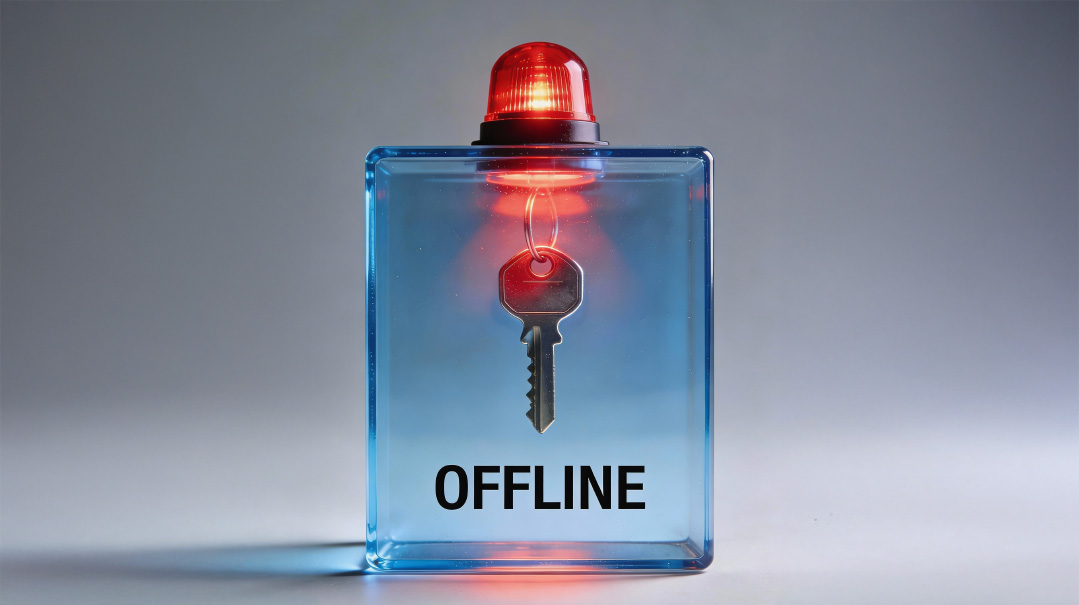Behind Closed Doors
| March 10, 2021How could a young couple shut such caring parents out of their lives?

Baila: We only want to help; why are you locking us out?
Chavie: Keeping our news quiet helps us keep our dignity.
When they talk about empty-nest syndrome, I honestly don’t get it. My youngest is in seminary, I have a son learning in Israel and one in Lakewood, and the rest are married, but I don’t find things quiet or boring in the least. Between one or the other of the young families coming for Shabbos, Yom Tov, or just for a visit; my older bochur driving in for dates; and Bubby-sitting the grandchildren who live nearby — there’s never a dull moment around here.
Besides, there’s always the homemade cookies and American-brand products that I beg anyone traveling to Israel to stuff into their suitcase. The phone calls across the time zones (Friday at 6 a.m. is Chayala’s preferred time for Erev Shabbos catching up). A constant flow of birthday cards to be mailed to the eineklach along with little things I pick up for them.
It’s not only Chayala who calls, either. I always feel sorry for those friends of mine who speak to their kids once a week, before Shabbos. I don’t like to tell them, because it wouldn’t be nice, but we’re a close-knit family, and I speak to my daughters and daughters-in-law all the time. We chat about the children, Shabbos plans, work, the news, you name it. And very often I’ll be talking to Chavie or Bracha, and one of the daughters-in-law — Goldy, Hindy, or Raizel — will be beeping in.
"Ma, could you do me a favor?” Chavie asked me one day, after we’d caught up on Dini’s new tooth and Yossi’s siddur-party solo. “My friend Bashi’s going to be in Brooklyn for Shabbos. Would you mind to pick up some socks and stuff for me at The Kids’ Place? She can bring them back for me, no problem.”
Chavie lived in an out-of-town community. She loved it, but the shopping facilities were dismal. Whenever they came for a visit, they did a major shopping spree to stock up on kids’ essentials.
“Nothing I’d enjoy more,” I said, smiling as I thought of the little extras I’d tuck into the package: Chavie’s favorite chocolate, candy for the kids.
“Thanks, Ma. I’ll text you an exact list.”
I hung up the phone, scribbling a note at the end of my shopping list. The Kids’ Place, the grocery, something nice to wrap it all up in… and of course, just as I put the pen down, my phone rang again. Chayala Israel, flashed across the screen.
Like I said, never a dull moment.
It’s funny how it happens, just when you’re thinking of someone, you bump into them. Chavie’s mother-in-law lives nearby, but we rarely see each other. Still, we chat every so often, and I’d just been thinking about whether she’d want to add something to the little package I was anyway sending (I’d stuck in a gift for Eli’s upcoming birthday along with the socks and candy, but maybe something small could still fit in?).
And then, as I scoured the grocery aisle for the Schmerling’s Rosemarie milk chocolate that Chavie loved, I met my mechuteineste.
“I was just thinking of you!” I said, and told her about the package I was putting together. “Want to add anything in? A surprise from the other Bubby?”
Chavie’s mother-in-law, Bina, gave a demure smile. She was my polar opposite, hailed from European stock, and had that quiet European dignity to her. My son-in-law was like that, too. “That would be lovely.”
“Always nice to be able to send something to them out there,” I said, finally spotting the chocolate I was looking for and throwing a few bars into my cart. “Chavie could do with some pampering right now.” Chavie was expecting her fifth , and worked from home, besides having the other kids home for months at a time during the past crazy year. She definitely deserved whatever I could send, even if chocolate couldn’t really take the place of a pair of hands to help with the kids. A shame she didn’t live closer.
Bina, however, looked a little surprised. “Oh?” She asked, delicately. “You mean, they… told you?”
“Told me?” I stopped short, puzzled. Chavie was in her sixth month already! “Of course they told me. I speak to her almost every day!” Wait, was something wrong? Something I didn’t know? My mind raced through recent conversations with Chavie. We’d spoken about the kids’ socks, the baby, her recent appointment… everything sounded fine.
“Oh, then of course, not to worry,” Bina said quickly. “I’m sure you’re a big support to them… it’s so nice, how you’re preparing this whole care package. I’ll drop something by later, maybe some hearty homemade soups for the freezer. It’s the least I can do…”
She waved and disappeared round the corner before I could continue the conversation. I shrugged and put it out of my head. Maybe she thought Chavie was very overwhelmed with the kids and the baby on the way. It was a lot to handle, granted, but I knew my daughter, she took things in stride. She’d be fine, b’ezras Hashem.
True to her word, Bina came by later on with her offerings, which I carefully labeled and added to the growing care package. I called Chavie’s friend to make sure she was around, and then drove over to drop it off.
On the way home, I stopped off at the local office of a large Meals on Wheels chesed organization, dropping off my weekly delivery of frozen meals. I’d been volunteering there ever since Chavie got married, preparing meals and doing occasional drop-offs. The office was run by a group of fantastic, dedicated women who managed the organization with supreme efficiency, and I knew most of them by name.
Tonight, it was Suri who buzzed me in to the inner office, looking unusually frantic.
“Who’s that — Baila? Oh, thank you, you have your regular delivery, don’t you? Listen, would you mind to go through to the freezer and slip those in yourself? You know where they belong, don’t you?”
“Sure,” I said, casting a curious look at the inner office as I passed. It was a mess; piles of loose papers all over and more spewing out of the printer. Suri and another woman who I didn’t know were poring over the reams of paper, apparently sorting them into some semblance of order. It didn’t look like they were getting anywhere fast.
“Can I help you out in here?” I offered, when I was finished with the freezer. “I’m not in any rush, and it looks like you’ve got a lot to do….”
Suri looked up, brushing some sheitel hair out of her face. “Oh, Baila, you’re a doll. I’m actually going to take you up on your offer, if you wouldn’t mind. We’re having some trouble with paperwork… we’re being audited, and we’re missing some documents, legal stuff. It’s all here somewhere, we just have to find it….” She gestured at the mess of papers. “This is Masha, our accountant. I was expecting one or two of the others to be here to help, but you know how it goes, this one has a family emergency and that one will try come in later….” She came up for air. “How are you with computers?”
“I know the basics. What are you thinking of?”
She showed me the database they had of families across the States who used the Meals on Wheels service.
“This information is way out-of-date,” she explained. “Anyone who signed up for the program since last year hasn’t been entered, we had a separate list, and I just need them all in one place.”
The two lists weren’t too complicated; it was just a matter of copying information over onto the database, changing the format slightly, and putting in the correct dates.
“Oh, and this symbol here —” she pointed to an asterisk. “This means the family pays cost price for the food they get receive. Some of the families we service pay for the cost of the meals, although many of them aren’t able to. If they’re paying for it, note it down in the last column, that way when we calculate weekly budget, we take the payment into account.”
“No problem.”
I texted Shmuel, so he wouldn’t wonder what was taking so long, and then got to work. I went through the list methodically, location by location, and was pleasantly surprised that Chavie’s small community had a branch of their own. Maybe it wasn’t so backwater after all. I wonder if she ever volunteered there? Maybe I should tell her about it… but then again, Chavie had enough on her plate just now.
I typed in another row of data, looked down the list for the next name.
Family S., 28 Linders Drive —
Linders Drive? That was Chavie’s street. And number 28 — that was Chavie’s exact house address!
Was there a mistake on the list?
I read the information rapidly. Two adults, four children. IMPORTANT — one child has severe nut allergy — NO NUTS!
My mind whirled. Eli. Eli was allergic to nuts. It was Chavie’s family, receiving daily Meals on Wheels from a chesed organization.
When did this happen? What had even happened? Was Chavie on bed rest? Was she too sick to cook meals?
I read further: Need — medium term. Financial difficulties.
There was no asterisk.
My daughter and son-in-law were experiencing financial difficulties, to the point that they needed meals sent in every day? How? Why? Meshulam, my son-in-law, had an excellent job at some real estate office, and Chavie worked from home, too…
I tried to focus on the information, putting data into boxes, but my fingers were shaking.
“I’m going to call it a night,” I told Suri, hoping she couldn’t see anything from my face. “I’m up to here…”
I felt bad for leaving them with all the mess, but I needed to get out. I needed clarity, I needed to know what was going on.
Should I call Chavie? Meshulam? His mother?
His mother. So that’s what she had meant with that strange question, “You mean… they told you?”
I dialed Bina’s number as soon as I was in the car.
“Hi, Bina, it’s Baila. I’m just calling… about the children. What we were discussing before… like how they’re managing. Like, financially… Do you know how they’re doing?”
“With the, you know, the situation?” My mechuteineste sounded hesitant. “I mean, it’s hard, but I think they’re working things out… I — I mean, we, we offered to pay their rent in the meantime, but they said they think they can manage…” She paused, then injected a cheery tone into her voice. “You know, we’re really blessed, they are so responsible, so sweet. You brought Chavie up well!”
My mind was in a whirl. Paying rent? And then there were the meals being delivered from this organization. How did I not know about this? “Since when are they having difficulties with the rent?” I blurted out, feeling like it was a silly question, but needing to know.
“You know, just the last month or so… since Meshulam was laid off.” Bina’s voice turned cautious. “You said you knew the whole situation…?”
My head was spinning. Meshulam lost his job? When? What had happened? No, I’d had no idea.
I fumbled through the rest of the conversation, somehow, and drove home in a daze. Why was Chavie hiding this from me?
When I spoke to Chavie the next morning, I carefully steered the conversation toward money and work. Maybe, maybe, she was just waiting for the right moment to tell me? Well, if that was the case, I was going to give her an opening.
“Wow, Chavie, you work so hard,” I told her, when she finished describing that she’d been working until after midnight the day before. “And at this stage, too! Are you going to take things a little easier next month?”
“Nah, Ma, it’s all good,” Chavie said easily. “You know I love my job… it’s not so strenuous, it’s more time-consuming. And Meshulam’s great about taking over bedtime and stuff that I can get some hours in..”
I jumped on the opportunity. “Oh? That’s so nice of him, after a long day of his own… what time does he get home?”
I held my breath. Here was her chance to come clean with me.
Chavie gave a little cough. “Oh, sometimes earlier, sometimes later, you know how it goes,” she said airily. Now that I was listening closely, I thought I could detect some strain in her voice. “Anyway, gotta go, Ma, great to catch up! We’ll speak soon!”
And before I knew it, the line went dead.
My mind was spinning crazily, and at the same time, I was simply stunned.
They were hiding something from me on purpose. Something huge, like a lost job and precarious finances. Hiding it from me, not from his parents, not from the chesed organizations, and surely their own community must know.
Fury, hurt, and embarrassment slithered through me, thick and strong. And the anger, the frustration, the total incomprehension — why didn’t they tell me? I could’ve helped, Shmuel has connections (did they tell him? Am I the only one in the dark?), we could’ve helped them with money, found him a new job, what on earth was this secretiveness all about?
If I could tell Chavie one thing, it would be: Hiding such a thing isn’t just hurtful, it’s also embarrassing, and means that we can’t be there to support you. Why would you keep it a secret?
The first time I was bothered by my mother’s helpfulness was just after I got married.
It was a few weeks after sheva brachos, and my sister, Bracha, was over at our new apartment, ostensibly helping me clean up for Shabbos, but mostly prancing around the kitchen admiring my serving dishes and some other gadgets that we got as wedding gifts.
“Ooooh! This is so cooool! What is it?” she asked, waving a small thing at me. I glanced up from the spice rack.
“A spiralizer? I think? Leave it on the shelf, it’s with all the stuff that still needs toiveling.”
Bracha hummed to herself as she explored. “You know, I feel bad, I really came to help out. Ma said you weren’t sure how to organize the cabinets, I see what she meant — they’re a weird size and the shelves are sooo deep, you could literally lose yourself in there! Want me to try reorganize?”
Something was jarring about what she said, but I was focusing on too many things to pay attention. It was only later — after Bracha had finished playing around with my pantry, and supper was cooked, served, and cleared — that I realized what it was.
I’d told Ma about my difficulties with the cabinets, but I hadn’t though she would share it with the rest of the family. To be perfectly honest, I was a little embarrassed about how things turned out — it had become a whole Issue, with Ma sending over the troops (read: little sister) to help me reorganize things… and all I’d wanted was to vent a little about the kitchen storage in our rental apartment.
Time moved on, we moved to another city, but over the years we saw it play out again and again. Ma’s great, she’s warm and loving and totally “there” for us, and so quick to help out… but maybe that’s the problem. She can be too quick to jump in, try to take over the problem — and worst of all, she doesn’t seem to realize the extent to which I — we — would rather have certain things kept private.
We’re a close family, and we all speak to Ma pretty often. And she’s great at keeping us updated on each other’s lives, sometimes too much so. Like when she let slip that Yaakov and Goldy were moving, before they wanted to share the news. Or casually commenting on how one of the grandchildren were struggling in school. It wasn’t a secret, per se, but it wasn’t something I’d want shared about my child.
Meshulam’s family is totally different. They’re completely European, privacy and dignity is their middle name, and he simply couldn’t understand how my mother could share things about my siblings and their kids without checking with them. I could understand it — it was more of a family-style thing — and I didn’t know if it bothered my sisters or sisters-in-law, we never discussed it. But it bothered me.
But I tried not to let it disturb me too much, because to be fair, Ma always has the best of intentions. All she wants to do is help us out — and the rest of the world, too. When she’s not busy hosting, talking, or making packages for us children, she’ll be volunteering for chesed organizations, cooking dinner for families in need, or arranging Tehillim groups for cholim. And honestly? Ma’s awesome and we all really look up to her.
So we managed the status quo for a while. I was careful what I shared with Ma over the phone, and enjoyed and appreciated our daily conversations. And it worked — until Meshulam lost his job.
There had been warning signs, of course: The company struggling, employees finding themselves laid off. But Meshulam was a dedicated worker who’d been with the company a while, so we hoped things would be okay. Still, it didn’t come as a total surprise when he broke the news to me that his job at Evergreen Financials was over. What did surprise me was what he said next.
“And Chavie, please, let’s keep this private, okay?”
He was avoiding my eyes when he said that, which was out of character. Strange.
“Private? I mean, sure, I won’t discuss it on the streets, but don’t you think it won’t be much of a secret when people see you around during the day? Or your colleagues… they’ll know. And if you’re looking for a new job…”
“I know, I know,” Meshulam cut in, busying himself at the sink. “I meant really from family. Not to tell, you know — your mother.”
Not to tell Ma? That hadn’t occurred to me. I mean, sure, it wasn’t great news, but these things happen — especially nowadays. And Ta had so many connections, he would probably jump right in and—
“I don’t want it,” Meshulam said, reading my mind. “The attention… the pity. I don’t need a thousand leads and all the pressure, have you spoken to Gerber yet, how about a remote job… I know your family. Besides, what do your brothers know about looking for jobs? They’ll probably all start trying to talk me into starting a business.”
I laughed a little, he was so spot-on. But then I turned serious again, because I understood him. My family were outgoing, lively, go-getters. Each of my brothers owned a business. If we told Ma, we’d be flooded with advice, ideas, suggestions, (pity?) within a day. Meshulam was embarrassed. I wasn’t going to be the one to air his unemployment publicly.
So I bit my tongue, and kept up the daily conversations with Ma — about the children, the baby, my job, upcoming vacation, anything but Meshulam’s work, the job hunt that was slowly taking over our lives, and money.
And money was a biggie. My salary simply wasn’t enough to cover rent, bills, food, expenses. When Meshulam’s parents came to visit for a day, they realized something was up pretty fast.
“We have to tell them,” Meshulam told me, when we convened for a brief, urgent discussion in the kids’ bedroom. “My mother keeps looking at me strangely, she wants to know why I’m home, she won’t ask, but I can tell she’s worried. And Ta pulled me aside before and wanted to know about money — apparently Eli told him that we’re poor and he can’t have new shoes even though his old ones have holes. Kids,” he said, shaking his head.
“So, you’re going to fill them in?” I asked, feeling a bit resentful. Here I was, keeping the secret from my mother at all costs, while my in-laws were going to get the whole story.
“It’s different,” Meshulam said, eyeing me apologetically. “My parents won’t breathe a word… and besides, we need their help.” He looked away. “The electricity bill… it’s too much for us. And it needs to be paid up this week. My parents will help us out.”
So there it was. We didn’t have a choice, and it was true, his parents would never say a word. But after that, every time I spoke to Ma, I felt even worse hiding what was going on.
“Im yirtzeh Hashem, this whole parshah will be over soon,” Meshulam kept telling me. “It’s only temporary, and once I move jobs, you can just gloss over why…”
But it wasn’t so simple. Job hunting was exhausting, depleting, and frankly — mostly unsuccessful. Meshulam was constantly busy with résumés and interviews and following up leads, constantly frustrated at rejections or, maybe worse, a total lack of response. I was taking on far more hours than I could actually manage in the hopes of covering some of the deficit in our budget, and worst of all, the bills just kept on coming.
Unemployment is something I wouldn’t wish on anyone. It’s not just a parnassah issue, it spills over into everything: shalom bayis, the kids, the house, all the little stuff that we suddenly had to scrounge to pay for. New socks for the kids. A few dollars for a school trip. All those things that you take for granted until the coffers have simply run dry.
“You work so hard, Chavie,” Ma would tell me. “Shouldn’t you be taking things easy, at this stage? Have a rest, put your feet up?”
Honestly, I was barely even thinking about that. Between the kids and work and trying to be there for Meshulam when he came home after one disappointing interview after another — putting my feet up was like a vague dream at the back of my mind.
So I brushed it off, kept my husband’s secret, and played things cool and happy and easygoing even while I was desperately trying to hold it together.
And then Ma found out.
I’m still not sure exactly how. From my in-laws? An acquaintance? Maybe a friend of mine found out and let it slip? But whatever the case, it was just another one of our regular phone calls, I was absentmindedly washing dishes while we chatted about nothing, and then Ma asked bluntly, “Chavie, did Meshulam lose his job?”
I didn’t drop the plate I was holding, but my heartbeat jumped and I stood stock-still. How to respond without being defensive, without feeling guilty? Without betraying too much information that my husband wanted kept private? And how did she even know?
“It’s — yes, it’s true, but he’s looking for another one, things are okay, really, Ma,” I stammered, feeling awful.
“But why didn’t you say anything?” Ma asked, and I could her the hurt in her voice. “Ta and I, we want to help you out…”
Implicit in her tone was the accusation: Why the secret? We speak every day. How did you deliberately hide this from me?
I felt so guilty, like a kid caught in the act of misbehavior. And then on the heels of the guilt came a wave of anger: I’d had enough, I was dealing with enough, I was simply trying to keep my marriage afloat, the finances, my home, my children. I couldn’t handle this too.
“I’m sorry, Ma,” I said, helplessly. “It’s — it’s not something we really wanted to talk about.”
If I could tell Mommy one thing, it would be: We’re doing our best to keep our privacy and dignity in a sensitive situation. Please don’t make it harder than it needs to be.
(Originally featured in Mishpacha, Issue 852)
Oops! We could not locate your form.













